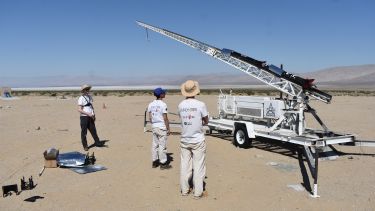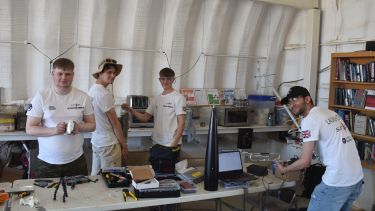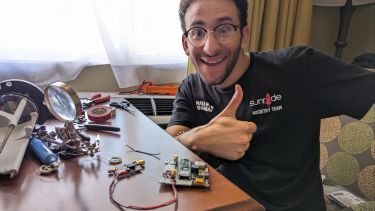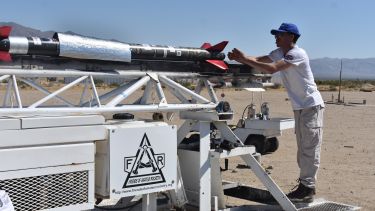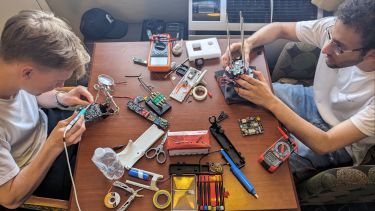The below blog post is written by MEng Electronic and Electrical Engineering student, Marawan Shaaban, who recently completed his second year of study at the University of Sheffield. Project Sunride is a student-led project, with a team made up of 80+ engineering students from the University of Sheffield. Since its founding in 2017, Project Sunride has been steadily growing, with multiple rocketry programmes carried out. Their current aim is to become the first UK student-led team to launch beyond the Kármán line (that's 100km above sea level!).
This summer, I set off to the California desert with other students from Sunride with a huge 2-stage rocket called ‘Karman Alpha’. The goal was to break the current national altitude record held by the team’s previous rocket ‘Helen’. I was in the launch crew and was responsible for the integration of the Sunstratos electronic payload, and the Sunride avionics systems.
The rocket was designed to reach a maximum altitude of 30.5km (100,000 feet), but unfortunately after 6.7km, the 2nd stage motor failed after the 2-stage separation, so the 2nd stage never got to fly the intended trip. Despite the setback, we were elated to see the avionics systems perform flawlessly for mission critical tasks, i.e. separating the two rocket stages mid-flight, which we were nervous about.
Overall, it was a very exhilarating experience, and finally an opportunity to put all our hard work and learning to the test. You might think that falling short of our trip's goal would be a discouragement to future work, but it's actually done the opposite, and every person on that trip has returned with even more excitement and ideas for ways to improve for future launches.
When I first started out, I had this notion that failing to meet our altitude goal would mean the whole trip and my time spent working on it would be a waste, but I've learned that's quite a naive way to look at engineering - it’s not as simple as that.
It would be similar to saying the SpaceX Starship launch was a failure because it exploded during flight; while completely ignoring the fact that the rocket is bigger than the Arts Tower, performed better than expected by every engineer, and was also the first of its kind to ever be built and flown. This means that the next attempt will only go upwards from here.
Analysing our own launch the same way, I would start by saying that 2 years ago, I didn’t even understand how electrical current was able to flow through a basic capacitor. The only rocket I had seen flying at that point was a water bottle that barely went 10m high.
In those 2 years, it's been an exciting, and challenging journey, and I've been hard at work learning as much as I can about all aspects of electronics through designing multiple systems in our rockets to log, transmit data, and interface with GNSS satellites. My Electonic and Electrical Engineering modules at the University of Sheffield have been absolutely invaluable as I found myself breezing through books, videos, and papers that would have taken me months to understand otherwise without the groundwork that EEE laid for me. I've been able to immerse myself into aspects of PCB design, circuit design, high speed digital design, power electronics, and RF technology as a result. Overall, I've learned and progressed so much since I started that it's honestly hard to feel much sadness about failing to meet the altitude goal.
It’s onwards and upwards from here, I'm still learning new things, and there are design issues to be fixed, and changed, particularly our power delivery system and radio choices. Mainly, there are new technologies and upgrades that we're already working on and prototyping so that we can make even cooler electronics that are smaller, cheaper and more reliable for future rockets. Let's see how far we can take this before graduating university!

